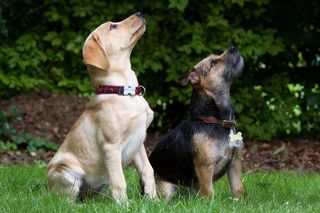Motivation
How Animals React to Inequality
Cooperative animals act differently when they are being treated unfairly.
Posted December 10, 2018

Not all animals cooperate, but among those who do, there is an important issue of fairness. In order for an animal to cooperate successfully, it must be helping another animal to achieve its goals, and its goals must also be fulfilled. That doesn’t mean that the animals need to understand this reciprocity, of course, just that they need to act in a way that allows their goals and their partner’s goals to be achieved.
One thing that might support cooperation is a preference for equality. If animals are sensitive to inequality, then that would suggest that they act in ways to promote equal behavior.
A highly-cited version of this behavior emerged in a study by Sarah Brosnan and Frans de Waal in a 2003 paper in Nature. They had pairs of capuchin monkeys in nearby enclosures do a task in which they would be rewarded for handing a token to an experimenter. In the equal reward condition, both monkeys received cucumbers as a reward for doing the task. In this case, the monkeys did the task well. In the unequal reward task, though, one monkey got a cucumber, but the other monkey got a grape for doing the task.
For capuchins, grapes are a much better reward than cucumbers. The monkey getting the cucumber refused to give the token back or to take the cucumber after seeing the other monkey get a grape. This finding suggests that capuchins are unwilling to participate in a task in which they are not rewarded in the same way as others.
A fascinating review paper by Jim McGetrick and Friederike Range in a 2018 issue of Learning & Behavior suggests that dogs do not act in quite the same way as capuchins.
In the dog version of the task, pet dogs who live together and are trained to give a paw on command participate in the study. Like the study with capuchins, there is an equal reward condition and an unequal quality condition. In the unequal quality condition, one dog gets a higher-quality food reward for giving a paw than the other. Unlike capuchins, the dog getting the lower-quality reward continues to give their paw.
However, the studies with dogs use a third condition in which one dog is rewarded for giving a paw, while the other dog is given no reward. In this condition, the dog who is not rewarded stops giving a paw. So, dogs seem to be sensitive to differences in whether they are rewarded, but not differences in the quality of the reward.
The studies demonstrate that the dogs are sensitive to differences in quality of rewards, so it is not that they just think all rewards are the same. It is not entirely clear why dogs differ from capuchins in this way, but one big difference is that dogs spend a lot of time getting rewards from humans, and so they may be more focused on getting a reward from the human than on the inequality of the rewards with the other dog.
One interesting result from other studies is that the dogs who stop responding when they are not rewarded are those who are better at stopping their behavior in general. Some dogs are quite impulsive. If you put food out in front of them, they have a hard time resisting eating it. And they have a hard time changing their response in a situation. Impulsive dogs keep giving their paw in this task, even when they are not being rewarded. But, dogs who are good at holding back are more likely to stop giving their paw when they are not rewarded.
Finally, the authors of this review point out that dogs are not necessarily doing sophisticated reasoning about inequality. That is, they are not reasoning that they were treated unequally and want to punish someone else for the unequal treatment. Instead, dogs seem to want to avoid situations that create inequality—perhaps because the inequality causes them stress. This pattern of behavior benefits the dog, even if the dog doesn’t understand why it is beneficial.
As an example, in one study, after the unequal reward condition, the two dogs who participated in the study were allowed to roam freely around a room. The experimenter (who gave the rewards) and the dogs’ owner knelt in the room. The dog who was unequally rewarded took longer to approach the experimenter and spent less time around the other dog than dogs who were equally rewarded. If dogs just avoid others that cause unequal rewards, that would decrease cooperation with humans and dogs who do not treat the dog well.
Since the initial work by Brosnan and de Waal, there has been a lot of interest in how animals deal with unequal rewards. Clearly, quite a bit of work needs to be done to understand the psychological mechanisms that lead to this effect. In addition, much more work needs to be done to understand differences across species. But, this ability to detect inequalities does seem quite important for forming a basis for animals to cooperate with each other.
References
Brosnan, S.F. & de Waal, F.B. (2003). Monkeys reject unequal pay. Nature. 425(6955), 297-299.
McGetrick, J. & Range, F. (2018). Inequity aversion in dogs: A review. Learning & Behavior, 46, 479-500.




